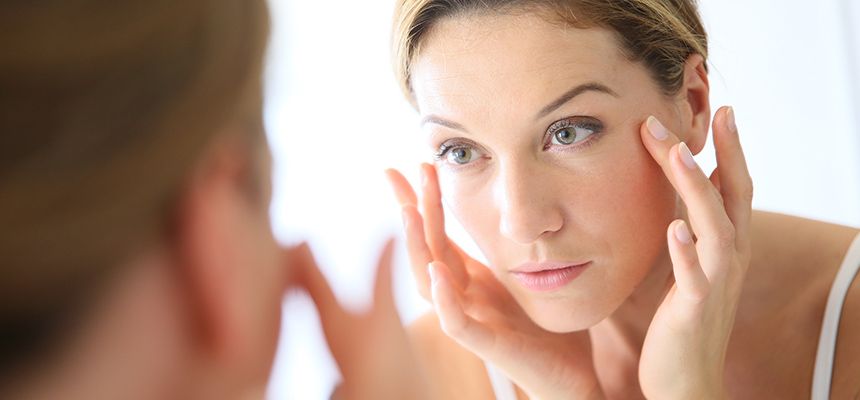Diet and lifestyle secrets for naturally clear skin
Name the biggest human body organ. Liver? No. Lungs? Nope. Intestines? No. Skin? Yes! Possibly you’ve never thought of your skin as a body organ, but it definitely is.
Apart from keeping your insides in, skin has some hugely important jobs to do. It provides protection from bumps and bangs, evens out variations in temperature, prevents invading bacteria from entering your body, and deflects a proportion of radiation and chemicals. So keeping your skin clear and healthy isn’t just a vanity thing, it’s a health thing.
Signs that your skin isn’t as healthy as it should be include persistent acne, eczema, dermatitis, rosacea and cracked lips. Here are some other symptoms of health problems that can be reflected in your skin:
- - Jaundice (yellowish skin), which can be a sign of liver disease
- - Cold sores, caused by the type 1 herpes virus
- - Butterfly rash (covers both cheeks in the shape of a butterfly), which can be a sign of lupus
- - Hair loss affecting eyebrows and eyelashes, possibly a sign of alopecia areata
If you’re experiencing any of these, see your GP. For less serious skin issues, keep reading for tips that could really help your skin to get its act together.
Addressing emotional factors that contribute to skin problems
Sometimes you can be doing everything right – good nutrition, regular exercise, enough water and sleep, excellent skincare regime – and your skin simply won’t show its appreciation. So maybe there’s something else going on, like emotional stress. Think about your personal and work life for a moment. Are your circumstances causing anxiety or depression? When something’s up in your emotional life, your skin tells it like it is. You might be saying “I’m fine” when people ask how you are, but your skin is saying “Not fine!”
Aiming for clear-skin perfect by dealing properly with stress, overwork and emotional issues isn’t just good for your appearance, it’s good for your life. Consider meditation, yoga or counselling to help with your headspace.
On a happier note, falling in love can also wreak havoc with your skin. When you click with someone sexually, your body lets rip with extra hormones, which can mean more oiliness to block your pores. If you’re in the chemically-crazy days of a relationship, pay extra attention to cleansing, exfoliating and a regular mask to keep your skin clear.
Dealing to the free radicals
Another factor that could be affecting the appearance and function of your skin is free radical damage. Free radicals are unstable molecules that cause damage to cell membranes by a process called oxidation. If you’re eating the wrong food, drinking too much alcohol, smoking cigarettes or spending time outdoors without sun protection, there will be more free radicals in your body. What’s more, any kind of inflammatory condition can also increase free radicals.
Apart from limiting lifestyle and environmental factors that produce free radicals, you can limit their damage with anti-oxidants - in your skincare, as well as your diet. Powerful antioxidants that can be eaten are also powerful when they’re included in skincare products, for example:
- - You can eat carrots, sweet potatoes, leafy greens and apricots for a dose of beta carotene antioxidants. You can also use our vegetable-based day moisturiser, which contains carrot, tomato and apricot – all good sources of beta carotene.
- - You can add berries to your breakfast, because they’re full of antioxidant polyphenols. And you can smooth Okana berry night moisturiser onto clean skin before bed, because its ingredients include berry juice.
- - You can get heaps of vitamin C by consuming kiwifruit, oranges, papayas, feijoas and broccoli. And you can add a tiny dose of pure ascorbic acid (vitamin C) powder to your moisturisers just before you use them, because it helps your skin to right free radicals and build collagen.
Helping your body to make collagen
As we age, our bodies produce less and less collagen, which can lead to thinner, saggy skin and wrinkles. You might find that taking a collagen supplement helps, or you can focus on your food to consume the building blocks for collagen. Here are seven goodies to focus on:
- 1. Salmon and other forms of oily fish. They’re full of essential omega-3 fatty acids, which protect the membrane that surrounds skin cells to support skin structure
- 2. Red vegetables. Rich in lycopene and vitamin C, both essential for collagen production
- 3. Dark green vegetables. They contain many nutrients that help boost the body’s collagen production
- 4. Orange vegetables. Rich in vitamin A, which boosts the body’s natural production of collagen
- 5. Citrus fruits. They help the amino acids lysine and proline to convert to collagen
- 6. Berries. They fight free radicals while helping to boost collagen
- 7. Garlic. Contains taurine and lipoic acid, which help to rebuild collagen fibres that have become damaged over time



Leave a comment
This site is protected by hCaptcha and the hCaptcha Privacy Policy and Terms of Service apply.